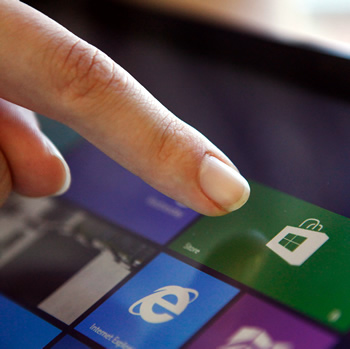Despite Microsoft's excitement at selling four million Windows 8 upgrades in four days, well-known industry blogger Paul Thurott says sales of the OS are "well below" Microsoft's internal projections. Get your salt shakers ready, but Thurott cites ones of his "trusted sources" at Microsoft for the tip, although fails to produce any specific numbers. To be fair though and in hindsight, Thurott does seem to have pretty accurate sources.
Despite the lack of numbers though, investors are a curious bunch, so we're likely to see official Windows 8 sales figures in the not-so-distant future. Until then though, anyone interested in watching the Windows 8 drama unfold will have to wade through a variety of anonymous leaks, specious rumors and fuzzy analyses in order to develop their own judgments.
Of course, if you don't fully trust Thurott's anonymous source, there have been plenty of other attempts to interpret Windows 8 sales. ExtremeTech touches on some of the facts we have to work with, including a chart of limited sample size from Soluto which paints Windows 8 in a positive light. There's also AdDuplex whose preliminary report indicates Surface is the single most popular Windows 8 device – a potentially discouraging figure when you consider Microsoft's own CEO said Surface sales were off to a "modest" start.
Although it's early yet and solid figures are difficult to find, analytics firm Net Applications determined in October that users were 5 times less likely to be running the release preview of Windows 8 than Windows 7 back in 2009. It's a tenuous but interesting link to potentially slow Windows 8 sales, indicating a lack of overall consumer interest prior to launch.
Additionally, I'd like to note that StatCounter, another web analysis tool, shows a very modest a bump in "other" operating systems. This doesn't mean much on its own, but "other" had been holding pretty steady between 2.5 and 2.75 percent since May. With the inclusion of November though, "other" shot up by two-tenths of a percent to finally top three percent. Were most of these Windows 8 users? Who knows, but with XP holding about 26 percent and Windows 7 holding about 40 percent of the market, take that as you will.

ExtremeTech also supposes Microsoft's silence itself may be a clue, as the company has been conspicuosly quiet since its "four million" announcement. Their premise is: if a company has a chance to brag about sales, they will. So why hasn't Microsoft been more forthcoming with positive news surrounding Windows 8 sales figures? Well, an absence of such news is certainly one possible explanation.
As Thurott points out though, even Windows Vista – arguably the most hated Windows since Windows Me – sold hundreds of millions of copies per year . Bearing that in mind, even if sales of Windows 8 remain below Microsoft's expectations, that doesn't necessarily mean Windows 8 should be tagged as a failure. Redmond will most likely distribute hundreds of millions of copies of 8 even if it doesn't meet the hype.
